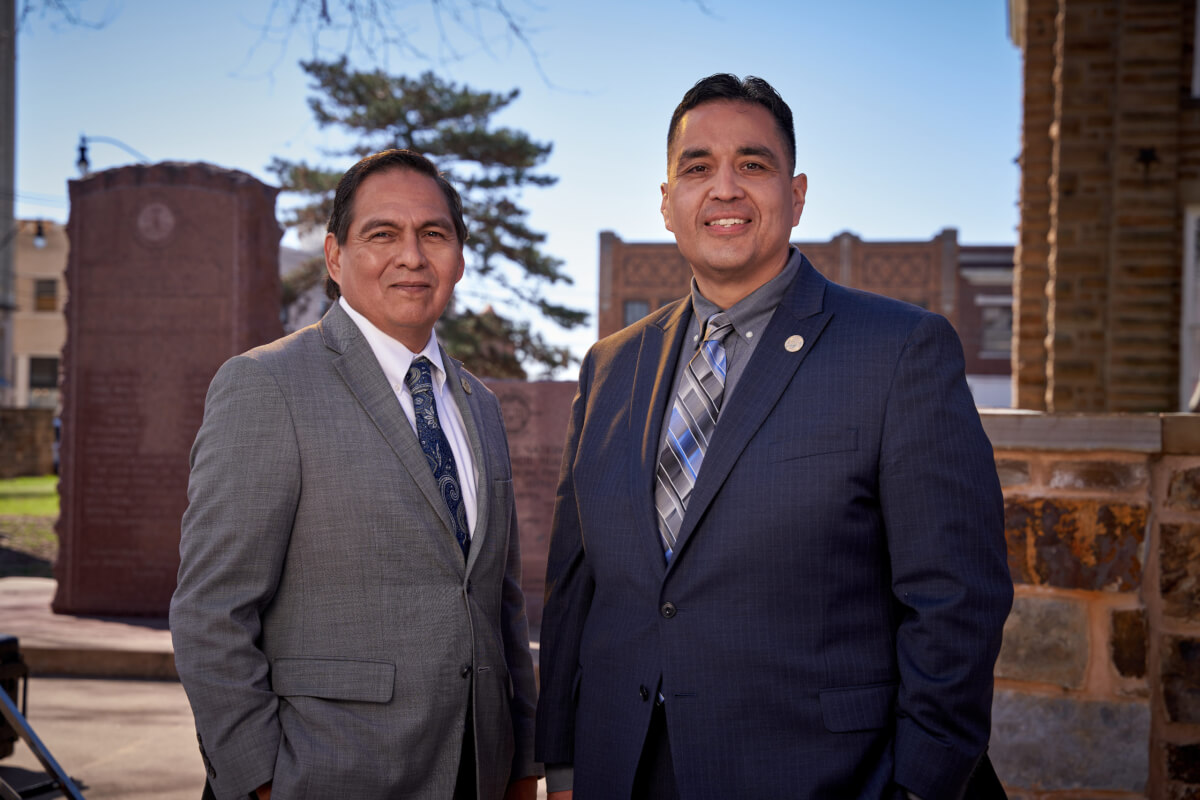
Preserving our past, protecting our present, planning for our future: The Muscogee Nation speaks out
By Lisa Mayfield Spence
Photography courtesy of Open Space Institute, Mac Stone Photography
The third in a series of articles exploring the past, present and future of the Ocmulgee National Historical Park and Ocmulgee River corridor. Read the first and second articles at maconmagazine.com.
Read the first article here and the second article here
Right here in our own backyard, the sacred and culturally rich ancestral homeland of the Muscogee-Creek Nation stands ready to welcome and espouse the change in designation from Ocmulgee National Historical Park to the state’s first National Park and Preserve.
“We have never forgotten where we came from,” said James Floyd, former principal chief of the Muscogee-Creek Nation. “The lands around the Ocmulgee River will always and forever be our ancestral homeland, a place we consider important and sacred.”
The Muscogee-Creek Nation represents more than 93,000 Muscogee and Yuchi citizens and is the fourth largest tribe in the United States, according to Floyd. Though its capitol is located in Okmulgee, Oklahoma, the Muscogee-Creek nation has direct ties to its deeply rooted cultural and political origins in the Ocmulgee River Corridor in Georgia.
“Muskogean people are the descendants of the mound builders and indigenous people who have occupied the Ocmulgee Old Fields in the Fall-Line regions of the Ocmulgee River and Macon Plateau for more than 17,000 years,” Floyd recalled. “Despite forced removal, war, allotment, boarding schools and generations of colonization, the Muscogee and Yuchi people are still alive and thriving in Oklahoma. However, we have never forgotten where we came from.”
Principal Chief David Hill said the significance of reconnecting with the tribe’s homelands means a great deal to the Muscogee-Creek people.
“The Ocmulgee lands, those surrounding the river, will always and forever be our ancestral homeland,” he said. “The Muscogee-Creek Nation shares the vision with our local partners to see the first and only National Park and Preserve in Georgia.”
The tribe supports a collaborative multi-agency approach to preserve, protect, manage and identify appropriate areas within the corridor to create a new National Park Service (NPS) unit. “For people who were forced to leave 195 years ago, we are thankful for the heartfelt welcome by the community today,” Chief Hill said.
Seth Clark, executive director of the Ocmulgee National Park and Preserve Initiative (ONPPI), whose mission is to expand the current site of the Ocmulgee National Historical Park into a National Park and Preserve, admitted it is our responsibility to atone for the sins of our past.
“The entire country has the opportunity to see Middle Georgia atone for its role in scarring a people and a region through forced removal all those years ago,” he said. “We are working with the Muscogee Nation to preserve and restore their sacred lands for us all. The whole region is uniting around the park expansion. This will have an impact far beyond the land conservation it entails.
“This story is theirs to tell. This land was theirs longer than it has been ours. So, to play a role in an effort that can potentially result in an increased physical presence of Creek ancestors in their beloved Macon Plateau is powerful.”
The proposed Special Resource Study (SRS) area for the expansion project includes the ancestral homelands of the Muscogee-Creek Nation. Forced to cede their ancestral homelands, they were removed to Indian Territory in Oklahoma on the Trail of Tears, known to Muscogee people as “Nene Estemerkv” (Road of Misery) in the 1830s.
“We left, but we have never surrendered or ceded our historic and cultural legacy tied to the Ocmulgee area in Georgia,” explained Chief Hill. “The Muscogee-Creek Nation has a long-standing history of preserving the Ocmulgee Old Fields, including via the Treaty of Washington in 1805 when the Muscogee Creek Nation specifically reserved the Ocmulgee Old Fields from land cessions and would only cede an eastern portion of the Ocmulgee River to the United States.”
The Ocmulgee Old Fields Reserve was not formally ceded until 21 years later in the 1826 Treaty of Washington.
“The Ocmulgee Old Fields are revered as a sacred place to the Muscogee people,” Floyd said. “The Muscogee-Creek Nation worked to declare the Ocmulgee Old Fields as an eligible Traditional Cultural Property (TCP) under the National Historic Preservation Act in 1995, receiving concurrence from the Keeper of the National Register in 1999.”
The Ocmulgee Old Fields was the first TCP east of the Mississippi River and encompasses 14,000 acres, extending from the Ocmulgee Mounds National Historical Park to the Bond Swamp National Wildlife Refuge to the south.
The NPS initiated the study of the Ocmulgee River Corridor in Middle Georgia in late 2019 as authorized in accordance with the John D. Dingell Jr. Conservation, Management and Recreation Act of 2019, according to Floyd.
“The SRS will evaluate the potential for establishing a National Park Service unit and findings of the study will be prepared for the Secretary of the Interior, who will submit the study, along with recommendations, if any, to Congress,” Floyd said.
Only Congress, through legislation, or the President, through use of the Antiquities Act, has the authority to establish a new unit of the NPS. The study area must meet four criteria to be recommended as an addition to the system: national significance, suitability, feasibility and need for NPS management.
“If any criteria are not met, the study concludes,” Floyd said.
The NPS conducted extensive research, including tribal consultation and targeted stakeholder outreach, and prepared the environmental and cultural history of the study area in the winter and spring of 2020. Then, the environmental context and cultural and historic context documents were presented for public comment to further inform the SRS in early 2021.
“The NPS is now finalizing the proposed study boundary for the SRS and they are evaluating the area for national significance,” Floyd said. “If national significance is determined, then the SRS will proceed to evaluate criterion two, suitability.”
The expansion of the Ocmulgee region means a great deal to the tribe itself. Muskogean ties to the cultural landscape make this area historically and nationally significant to the Muscogee-Creek Nation, according to RaeLynn Butler, manager of the Muscogee-Creek Nation’s Historic and Cultural Preservation Department.
“The Ocmulgee corridor retains the natural features that have been largely undeveloped and undisturbed, contributing to the historic character and integrity of the study area, making this a prime location for a National Park and Preserve,” Butler said.
The conservation of significant cultural and natural resources is a top priority to the Muscogee-Creek Nation, added Turner W. Hunt, also from the tribe’s Historic and Cultural Preservation Department.
“This can be achieved by taking a collaborative multi-agency approach for long-term management of the Ocmulgee River corridor,” Hunt said. “We believe a new park unit in the study area will help to preserve known and unknown cultural resources as well as create opportunities for more public education and recreation in the corridor.”
This will also increase access for tribal members and the public to learn more about the cultural areas that are currently not open to the public, Butler said, adding that they “support recreation, hunting, tourism and public education in areas that will not have adverse impacts to intact cultural and natural resources.”
The process is thorough and lengthy, but clear: All four criteria of the SRS have to be met and the Secretary of the Interior shall submit to Congress a report that describes the results of the study and any conclusions and recommendations.
Clark remains optimistic: “We look forward to seeing the park and preserve become a nationally-protected resource. It’s my sincerest hope our neighbors and public officials understand what this means for the soul of our community. This just has to happen.”
“This would be a huge victory for the Muscogee-Creek Nation and the State of Georgia,” Floyd concurred. “We would see the fulfillment of a Congressional promise made in the early 20th century to preserve the untouched regions and natural landscape of the Ocmulgee River Corridor. We would see greater legal protection of a significant cultural and environmental resource for future generations to enjoy. And it would be a historical moment that we share with our ancestors who came before us and those who sacrificed so much for us to be here today.
“It would be a victory we share with the community, local governments and the State of Georgia; an achievement first of its kind, grounded in unity.”
Chief Hill agreed.
“The protection and preservation of our cultural resources is one of the most important responsibilities we have as a Nation,” he said. “Our cultural resources are irreplaceable and they are part of who we are as Muscogee people.”
Next in the series: We’ll detail what comes next in the Congressional process to change the land’s designation from Ocmulgee National Historical Park to the state’s first National Park and Preserve.







